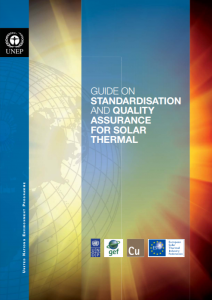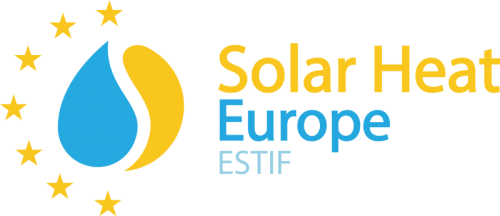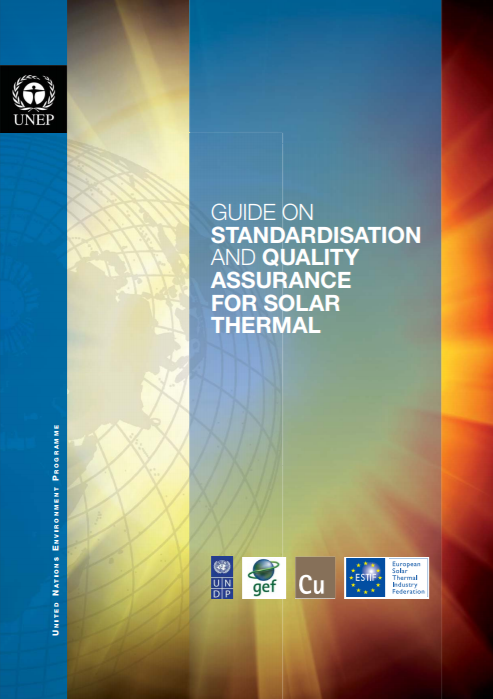Solar thermal is a mature and well established technology in many regions around the world. Taking into account its potential, often the market uptake lags behind. There are several reasons among which different barriers are hindering the development of the technology. Quality assurance measures protect consumers from low quality products but also enhance trust by consumers in the technology and in the market operators.
“New standards, regulations and testing procedures, coupled with appropriate labelling, could aid accelerated market uptake by building up consumer trust in the manufactured products. Th is is especially important for new solar technologies such as evacuated tubes and combisystems where many manufacturers are entering the market so that discerning a quality product is diffi cult for the consumer. Standard testing procedures on such details as hail resistance of the solar collector panel could also enhance international trade of the technologies”, IEA (2007)
This “Guide on standardisation and quality assurance for solar thermal” aims at explaining the relevance of quality assurance for a sustainable market development, besides providing an overview of quality assurance measures applied to solar thermal products and installations around the world. It also indicates some possible steps in order to set up a quality assurance system in a country.
It targets policy makers at different levels of governance, local and regional authorities, energy agencies, market surveillance authorities, manufacturers and installers, besides test laboratories and certifi cation bodies.
This “Guide on standardisation and quality assurance for solar thermal” was developed as part of the GSWH project, a joint initiative of the United Nations Environment Programme (UNEP) and the United Nations Development Programme (UNDP) and is funded by the Global Environmental Facility (GEF) with co-fi nancing from the International Copper Association (ICA). The objective of the GSWH project is to develop, strengthen and accelerate the growth of the solar water heating (SWH) sector.
GS WH consists of two components as follows:
WH consists of two components as follows:
- Component 1 – Global Knowledge Management (KM) and Networking: Effective initiation and co-ordination of the country’s specifi c support needs and improved access of national experts to state of the art information, technical backstopping, training and international experiences and lessons learned.
- Component 2 – UNDP Country Programmes: Work in the country programmes revolves around addressing the most common barriers to solar water heating development: policy and regulations, fi nance, business skills, information, and technology.ESTIF, as one of the project’s regional partner, is committed to the development of knowledge products and services. And for that, ESTIF has been entrusted with the task of elaborating three practical handbooks to include recommendations and best practices in the following areas which have been identified as key for strengthening the solar water heating market:
- Policy and regulatory framework
- Awareness raising campaigns
- Standardization and quality
The situation in different markets can vary considerably, there are always developments in
terms of products, in terms of standardization and certifi cation, as well as in terms of policy
framework. Hence, each case has its own specifi cities. As such this publication cannot be
considered a recipe book. It will be just a “Guide on standardisation and quality assurance
for solar thermal”.

